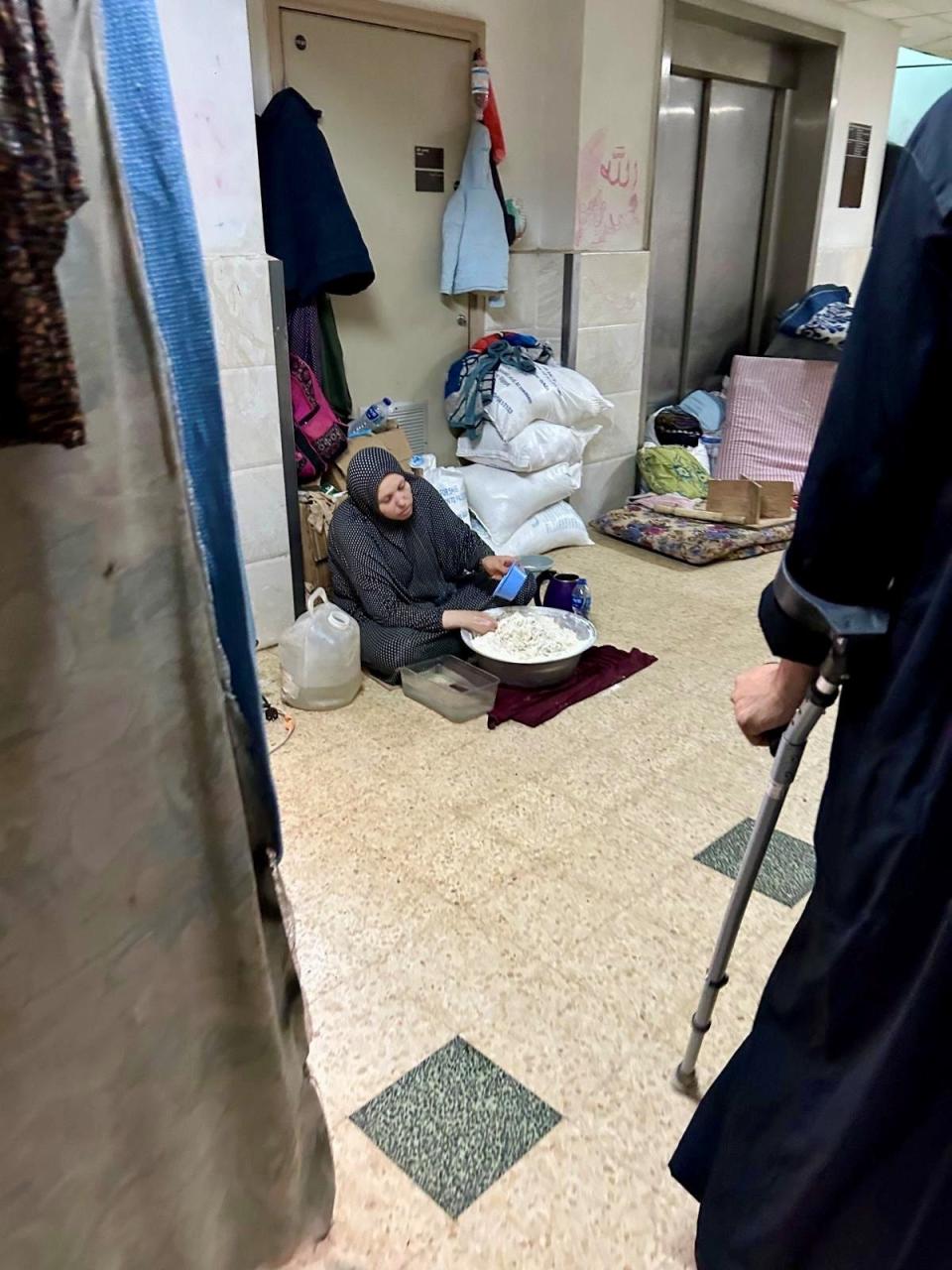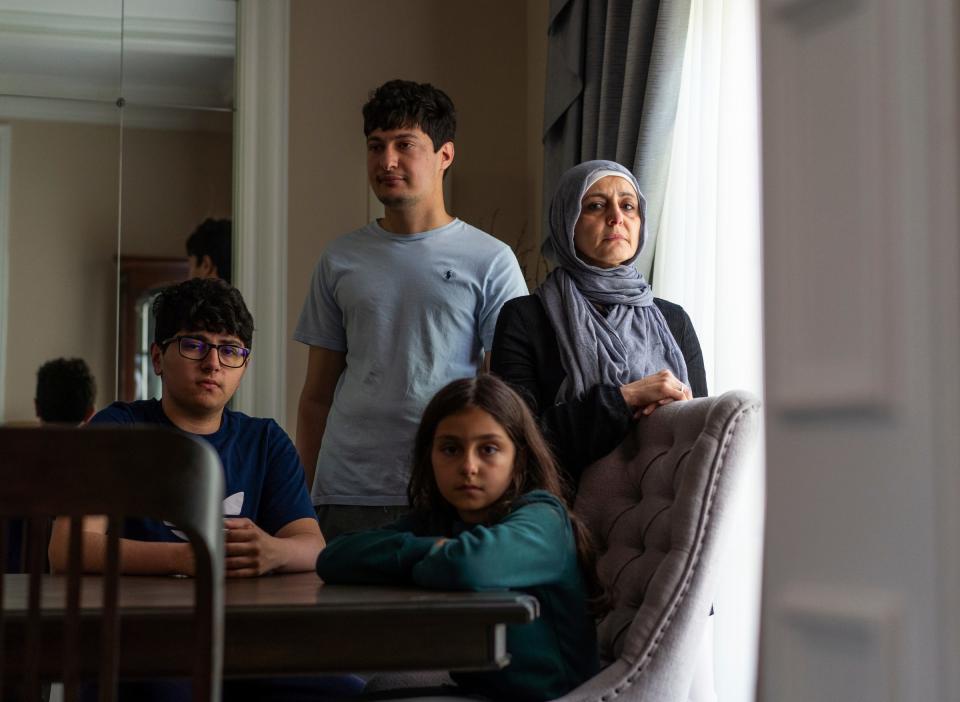West Bloomfield doctor part of relief group stranded in Gaza
Dr. Ammar Ghanem, a father of three from West Bloomfield, can't get out of Gaza.
He is trapped in a region decimated by seven months of war, where an estimated 35,000 people have died from injuries, hunger, dehydration, and disease, some of which is driven by lack of sanitation and limited access to medical care. Many, he said, feel hopelessness as their homes are destroyed and the fighting between Hamas and Israel continues.
"I've never seen anything like this," said Ghanem, a critical care and pulmonary physician who joined an international team of doctors and nurses May 1 on a medical mission at the European Hospital in Al-Fukhari, about 7 miles from the border city of Rafah. "I've been on multiple missions before, but it is hard to describe until you come and see it with your eyes. You cannot imagine the amount of need and the challenges until you come here."

Ghanem, who spoke to the Free Press via a video call late Tuesday from inside the hospital, said he and the other medical workers — including about a dozen from the U.S. — are unable to leave the Palestinian territory even though their mission is over.
That's because Israeli Defense Forces have seized the border crossing with Egypt in Rafah, Reuters reported, and travel into and out of Gaza is blocked. Israeli leaders have said Egypt's government halted traffic through the border while Egyptian leaders blame Israel for the stoppage. Regardless, it means food, supplies and other assistance can't come in, and medical workers like Ghanem also can't go out.
"There is no way to evacuate," said Ghanem, who is vice president of the Syrian American Medical Society, a nonprofit global medical relief organization. "We have a total of 18 people — physicians and nurses" — on the mission who also can't leave. "The majority of us are from the U.S., but we have about four or five from Jordan who were U.S.-trained. We have one person from Australia. We have one person from Saudi Arabia."
The medical mission, he said, was supported by the World Health Organization.
"They brought us here and they will be the ones to evacuate us," Ghanem said. "We finished our full mission, which was two weeks, on Monday. And as of (Tuesday), we don't have a plan."
A spokesperson for the WHO said he could not immediately answer questions from the Free Press about efforts to evacuate Ghanem and his colleagues from Gaza.
A State Department spokesperson told the Free Press it is advocating for the safe return of American medical workers, however, "the U.S. government does not control the border crossing or who is permitted to depart Gaza or enter Egypt. This remains a complex situation with serious implications for the safety and security of U.S. citizens.
"We reiterate our advice for U.S. citizens to heed our Level 4 Travel Advisory to not travel to Gaza. As a result of the armed conflict, the security environment within Gaza and on its borders is extremely dangerous and volatile."
Hospital becomes a refuge
Even though Ghanem said he knew there were risks associated with the medical mission, as the conflict — and the suffering — stretched on, he could no longer be complacent.
"I couldn't watch it anymore," he said. "I felt I should come and help."
In a region where only one-quarter of hospitals remain operational amid ongoing fighting, the European Hospital in Gaza has become a shelter for families who have nowhere else to go, Ghanem said. By some estimates as many as 30,000 people are living in and around the hospital.
"It is the only functioning tertiary center that is left here in south Gaza," he said.
"The hospital is occupied by displaced people. There's tons of them. They occupy all the corridors, the stairs, the rooms — even taking some of the staff rooms and the offices. They are everywhere. Sometimes, we see kids inside the ICU (intensive care unit), playing. Imagine the risks that come with that kid who is 5 years old and coming to the ICU with all the infection we have."

Entire families have walled off bits of hallways with bedsheets hung as curtains for a small amount of privacy. The wounded, he said, often have severe injuries such as brain trauma, limbs that must be amputated, multiple burns and other injuries that require very specialized care and complex surgeries.
Among the biggest obstacles, Ghanem said, is the lack of supplies to properly clean wounds and sanitize hands and equipment. There is no rubbing alcohol, nor enough medical gowns or surgical gloves, swabs or sanitary dressings.
"We have a major issue with infection control," Ghanem said. "We had multiple surgical success stories when it comes to trauma patients, but they end up dying from infections — even young people.
"We see unusual infections that are resistant to antibiotics, gram negative bacilli, which we rarely see in the U.S. They have to use antibiotics that are very strong and have side effects. Many of these patients end up sick with multisystem failure and they die from this. These are the challenges that they face.
"A majority of people we treat are children and women. This is the other heartbreaking thing" with only enough food and water to get by day by day — with no guarantees for tomorrow.
UN: 'Nowhere is safe now' in Gaza
The intensity of the fighting has ramped up in Gaza over the last week, as Israel issued an evacuation order for the eastern part of Rafah. Its military drove tanks through residential areas of the city and Hamas fired rockets. Reuters reported 82 Palestinians were killed in a span of 24 hours.
Although the European Hospital is about 7 miles away from Rafah, Ghanem said there is a risk that at any time, a wayward missile could strike the hospital or military strategy could shift.
"They guarantee us, according to the Department of State, they are not going to attack this hospital," he said. "They consider us to be safe. But you always worry about some rocket that may hit our area, or we worry about the promises being made in the past that are then not fulfilled. It's happened before."
A United Nations staff worker was killed Monday and another was injured when their vehicle was hit while driving to the hospital.
"For people in Gaza, nowhere is safe now," said Farhan Haq, deputy spokesman for the UN Secretary-General.
Dr. Mufaddal Hamadeh, president of the Syrian American Medical Society, said Ghanem and the other medical volunteers are heroes.

"They are trapped — literally trapped," Hamadeh said. "They are coping with the stress and the fear and that has escalated since the closure of the border in Rafah. They are hearing bombs falling day and night. All these things are creating a great deal of anxiety for them."
A family worries
Amnah Allboani Ghanem and her children, Yaser, Zied, and Haneen, wait in West Bloomfield for news about Ghanem and the other U.S. medical workers.

"Sometimes I break down," Allboani Ghanem said, worried that her husband of 23 years might not make it home safely. "And the kids feel so bad. My son sent him a message after the bombing in Rafah started. He sent him a text that said: 'Baba, I love you so much. We are so, so proud of you. Please, please take the first opportunity to come back because I cannot imagine my life without you.'
"We are so proud of Ammar and his big heart. We miss him a lot. We are worried about his safety."
Allboani Ghanem recalls that before her husband left for the Middle East, he bought a big bag of chocolates to bring with him to the hospital in Gaza.
"He knew the kids would be missing that," said Allboani Ghanem, who is a biomechanical engineer and an adjunct professor at Lawrence Technological University. "He is a very kind person. He is always thinking about the smallest things. He said, 'The kids are going to love these chocolates.' "

She and her son have been calling their elected officials, hoping they will intervene on behalf of the humanitarian workers stranded in Gaza.
"They keep telling me that it's a very sensitive matter," Allboani Ghanem said. "It's a very complex matter, but they say they will try their best. They are assuring me that he's going to be safe at the European Gaza Hospital.
"This is not calming me at all because it's a war. Mistakes happen. We never know what's going to happen."
More: Egypt rips Israel's 'desperate attempts' to deflect blame for Gaza crisis: Live updates
U.S. Rep. Haley Stevens, D-Birmingham, who represents Ghanem's congressional district, is monitoring his case, working with the State Department and his family to ensure his safe return, said spokesperson Hayley Gray-Hoehn.
Stevens, she said, "is thankful to the dedicated humanitarian aid workers, like Dr. Ghanem, who are using their skills to help alleviate suffering for the civilians of Gaza. Rep. Stevens encourages the Israeli government to continue to protect aid and medical workers and allow for their safe passage in and out of Gaza.”
Hamadeh said the Syrian American Medical Society is circulating a petition to send to President Joe Biden, demanding intervention. Others are lobbying senators and representatives in Congress.
"I don't know what is it gonna take to get those those volunteers home, but are we so impotent that our own president and our own government cannot guarantee the safety of American volunteers to get out of Rafa? Are we that impotent?" he asked.
Calling humanitarian aid workers in Gaza and other parts of the world "brave," White House Press Secretary Karine Jean-Pierre said during a news briefing Tuesday that the Biden administration is working to protect them amid the ongoing conflict.
"They actually go out there and do that brave work to offer assistance — much needed — to folks on ... the ground," she said. "And so, we appreciate that. We want to see them protected. We want to make sure that they have the ability to continue that work. "It is important that we see humanitarian aid workers protected. And those are conversations that we continue to have with the Israeli government."

While he waits for his chance to come home, Ghanem said he'd like to send a message of unity to the often divided American community: "As human beings, we are against the killing of civilians, anytime, anywhere. And we are against what happened, especially to civilians. But the response is beyond what you can imagine.
"Mass killing them by cutting off access to clean water, flooding them with sewage, cutting their food and destroying their houses is not the solution. So we hope that our community will understand this and will work together. Because if we all are against killing civilians and we all are against war, then we probably can work together to solve this."
Contact Kristen Shamus: kshamus@freepress.com. Subscribe to the Free Press.
This article originally appeared on Detroit Free Press: Dr. Ammar Ghanem of West Bloomfield stranded in Gaza

